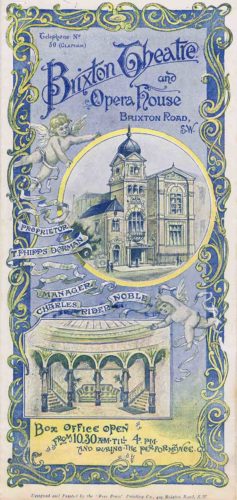Following the interest in our recent article exploring the entertainment culture that has thrived in Brixton since the Victorian era, we decided to do a deep dive into some of Brixton’s most beloved music halls and theatres, still standing or otherwise!
Brixton has a long history of theatres and music halls. During the Victorian era music halls and Variety Shows entertained the masses with evenings of singing, comedy and performances. Between 1894 and 1920 four theatres opened in Brixton, most of which have been redeveloped.

The Brixton Theatre
Brixton’s first theatre was built by the renowned Theatre Architect, Frank Matcham, in 1894, opening a year after the Tate Library next door, with a foundation stone laid by Sir Henry Irving. Brixton Theatre had a capacity of 1,504 and offered ‘serious’ plays with weekly presentations by touring companies.
A review written in September 1896 in the Penny Illustrated Paper and Illustrated Times describes the building: “The main entrance is in the tower-like front, surmounted by a cupola, facing Brixton Oval, and adjoining the Tate Free Library. The building is perhaps less impressive from without than from within, where everything is most artistic and comfortable. A spacious staircase leads to a semi-circular crush-room, and thence to the different parts of the house, which will accommodate fully two thousand people. The pit is said to be one of the finest yet devised – each row being higher than the one in front, giving every-one a complete view of the ample stage, which is cut off from the auditorium by a thick proscenium wall and a fireproof curtain that can be lowered in eight seconds.”
At Christmas the theatre would put on popular pantomimes, later in competition with the nearby Empress Theatre on Brighton Terrace. The theatre was renamed the Melville Theatre in 1940, after Frederick Melville, who ran the Theatre between 1907 and 1938, but was destroyed shortly afterwards by a high explosive wartime bomb in November 1940.






